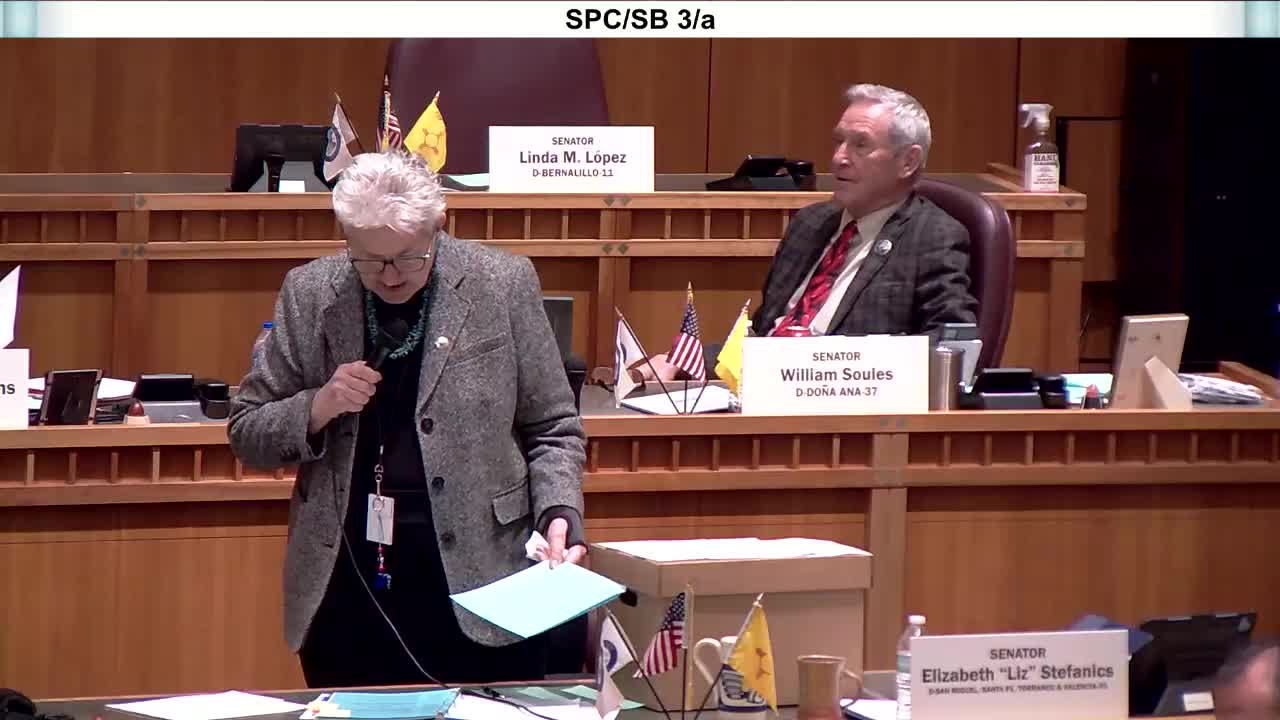Senate passes wildfire preparedness bill creating task force, grant programs and fund
February 22, 2025 | Senate, Legislative, New Mexico
This article was created by AI summarizing key points discussed. AI makes mistakes, so for full details and context, please refer to the video of the full meeting. Please report any errors so we can fix them. Report an error »

The Senate on a final vote approved Senate Finance Committee substitute for Senate Conservation Committee substitute for Senate Bill 33 with an emergency clause. Senator Elizabeth Stefanik, the bill sponsor on the floor, said the bipartisan measure aims to address property insurance challenges caused by wildfires and to help homeowners and communities harden structures to reduce wildfire risk.
"This bill is to address the issue of property insurance in our state due to wildfires to ensure that people have the opportunity to harden their homes and be more eligible for reasonable rates for fire insurance," Senator Elizabeth Stefanik said as she explained the bill on the floor.
The measure expands the membership of a wildfire-related task force from 12 to 16, directs mapping of high-risk areas, directs development of standards for building codes and defensible-space practices, and charges the state forester with developing wildfire-prepared certification standards and grant guidelines. It creates a wildfire-prepared program within the Energy, Minerals and Natural Resources Department and establishes two grant programs: one to political subdivisions to build local capacity for projects such as hazardous-fuel reduction and structure hardening, and the other to "qualified entities" (including political subdivisions and contracted entities) to assist eligible homeowners who cannot afford hardening measures. The bill requires that 50% of grant funding go to the qualified entities that assist residents.
The statute-language added a liability limitation "that nothing in the act guarantees benefits" and that no new private right of action is created by the act, the sponsor said. Section 5 creates a Wildfire Prepared Fund but contains no specific dollar amount; appropriations would be set in the state budgeting process (the sponsor cited House Bill 2, the general appropriations vehicle).
Senators who asked questions sought clarification on whether the program could influence federal land management and how standards would apply to existing homes. Senator Stefanik said the state forester would coordinate with the U.S. Forest Service and tribal land managers when appropriate and that standards would primarily apply to renovations and to defensible-area work around dwellings rather than imposing direct statewide penalties for noncompliance.
Senator Stefanik moved final passage with the emergency clause; the presiding officer announced a vote tally of 37 in the affirmative, 0 in the negative. The bill passed the Senate with the emergency clause and will proceed as provided by the legislative process.
The floor debate emphasized the bill’s planning and grant structure: it creates a state-level program and task force to produce mapping and standards and to provide grants and technical assistance, not a direct statewide ordinance or penalty regime. Sponsors and supporters said the goal is to reduce wildfire damage and to make properties more insurable.
"This bill is to address the issue of property insurance in our state due to wildfires to ensure that people have the opportunity to harden their homes and be more eligible for reasonable rates for fire insurance," Senator Elizabeth Stefanik said as she explained the bill on the floor.
The measure expands the membership of a wildfire-related task force from 12 to 16, directs mapping of high-risk areas, directs development of standards for building codes and defensible-space practices, and charges the state forester with developing wildfire-prepared certification standards and grant guidelines. It creates a wildfire-prepared program within the Energy, Minerals and Natural Resources Department and establishes two grant programs: one to political subdivisions to build local capacity for projects such as hazardous-fuel reduction and structure hardening, and the other to "qualified entities" (including political subdivisions and contracted entities) to assist eligible homeowners who cannot afford hardening measures. The bill requires that 50% of grant funding go to the qualified entities that assist residents.
The statute-language added a liability limitation "that nothing in the act guarantees benefits" and that no new private right of action is created by the act, the sponsor said. Section 5 creates a Wildfire Prepared Fund but contains no specific dollar amount; appropriations would be set in the state budgeting process (the sponsor cited House Bill 2, the general appropriations vehicle).
Senators who asked questions sought clarification on whether the program could influence federal land management and how standards would apply to existing homes. Senator Stefanik said the state forester would coordinate with the U.S. Forest Service and tribal land managers when appropriate and that standards would primarily apply to renovations and to defensible-area work around dwellings rather than imposing direct statewide penalties for noncompliance.
Senator Stefanik moved final passage with the emergency clause; the presiding officer announced a vote tally of 37 in the affirmative, 0 in the negative. The bill passed the Senate with the emergency clause and will proceed as provided by the legislative process.
The floor debate emphasized the bill’s planning and grant structure: it creates a state-level program and task force to produce mapping and standards and to provide grants and technical assistance, not a direct statewide ordinance or penalty regime. Sponsors and supporters said the goal is to reduce wildfire damage and to make properties more insurable.
Don't Miss a Word: See the Full Meeting!
Go beyond summaries. Unlock every video, transcript, and key insight with a Founder Membership.
✓
Get instant access to full meeting videos
✓
Search and clip any phrase from complete transcripts
✓
Receive AI-powered summaries & custom alerts
✓
Enjoy lifetime, unrestricted access to government data
30-day money-back guarantee

